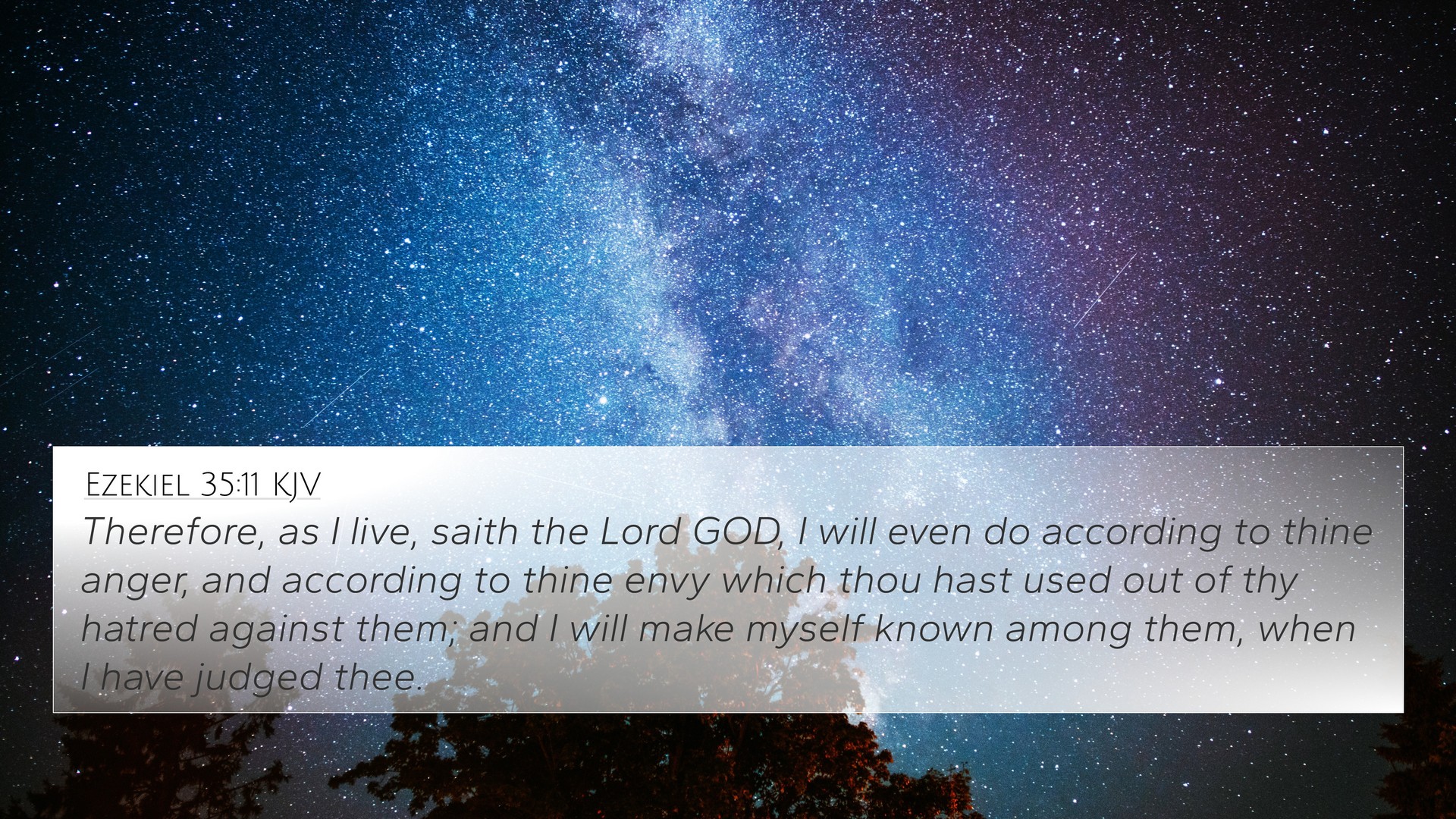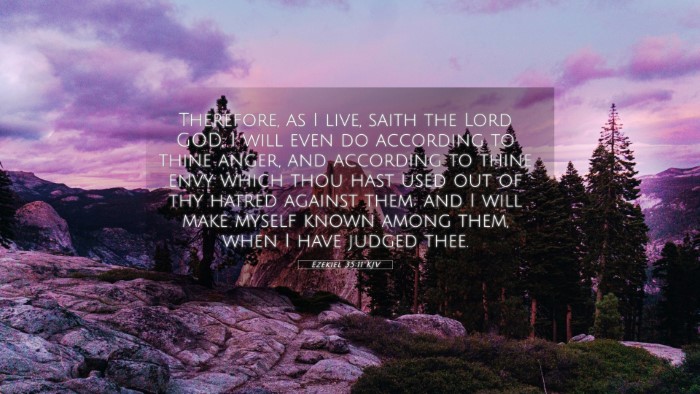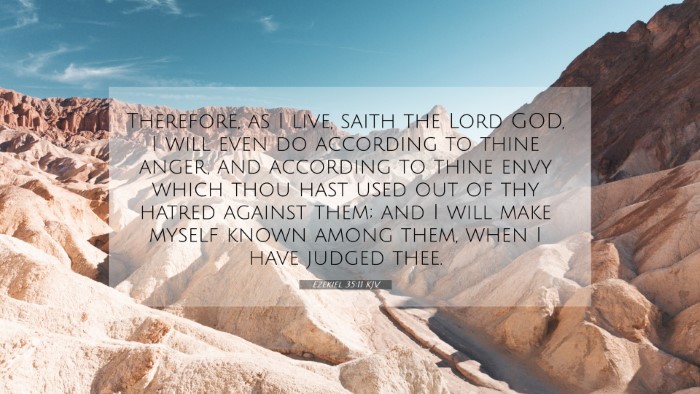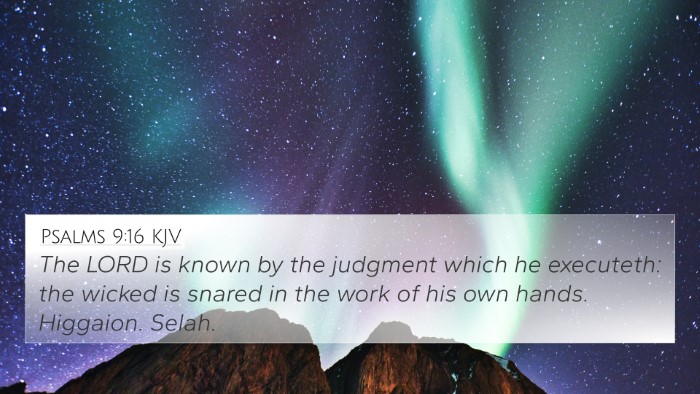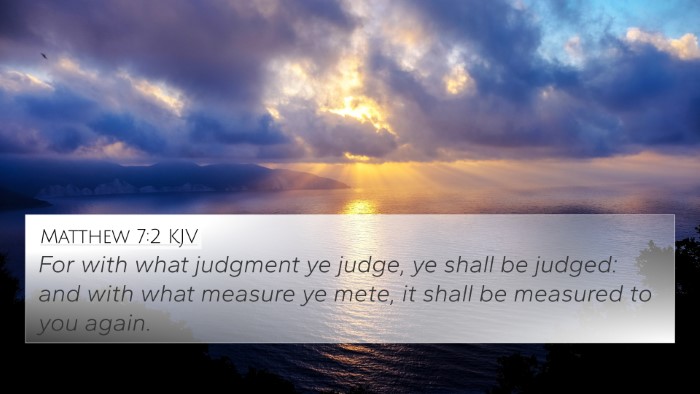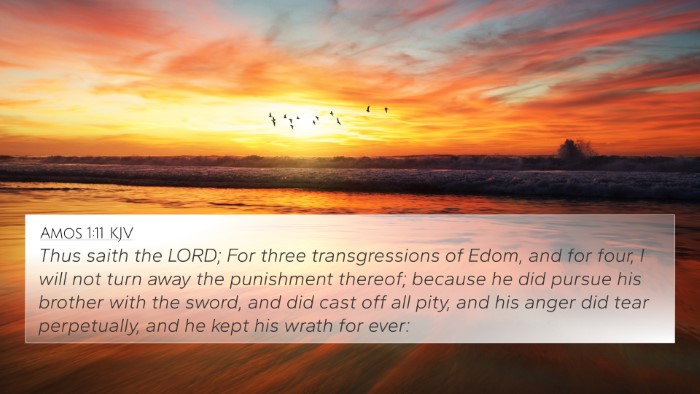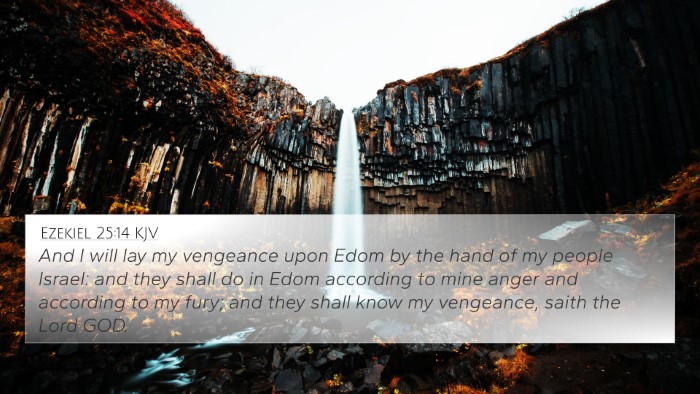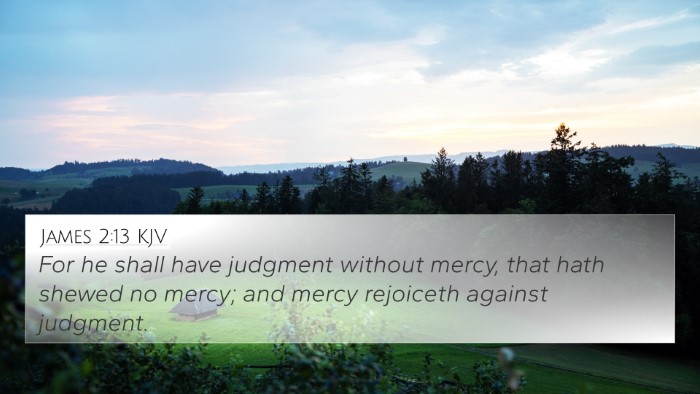Ezekiel 35:11 - Understanding and Interpretation
Bible Verse: Ezekiel 35:11
Verse: "Therefore, as I live, says the Lord God, I will deal with you according to your anger and according to your envy which you showed in your hatred against them; and I will make myself known among them when I judge you."
Overview of Ezekiel 35:11
Ezekiel prophesies about the judgment of Mount Seir (Edom), reflecting God's righteous anger towards those who harbor hatred and seek vengeance against His people. This verse emphasizes the principle of divine retribution and the certainty of God's justice.
Commentary Insights
Matthew Henry’s Commentary
Matthew Henry highlights that God's judgment will be directly proportional to the malice and anger displayed by the people of Edom. It reflects a theme of divine justice where the actions of individuals toward others invoke God's reaction. The hatred that Edom bore toward Israel, God's chosen people, results in God's righteous anger and will lead to their eventual downfall. God is depicted as a sovereign judge who is aware of both the actions and the motivations behind them.
Albert Barnes’ Notes on the Bible
Albert Barnes emphasizes that the phrase "as I live" underscores the certainty of God's declaration. The verse indicates that God will act according to the anger and envy that the people of Edom displayed. The judgment will serve two purposes: it will demonstrate God's holiness and sovereignty while also revealing His concern and protective nature toward His people. Barnes points out that this judgment serves as a warning to others about the consequences of harboring ill will against God's people.
Adam Clarke’s Commentary
Adam Clarke notes that the prophecy serves as a prophetic declaration against Edom, symbolizing the broader principles of justice and revenge. Clarke points out that the extreme emotion of envy indicative of a deeper character flaw leads to a fate that is not only deserved but necessary for God's justice to prevail. The verse illustrates the significance of how one's behaviors and emotions, particularly negative ones, can invoke divine responses, shedding light on God's interaction with humanity.
Cross-Referenced Verses
To fully grasp the themes of Ezekiel 35:11, consider the following Bible verse cross-references that illustrate similar themes of God's judgment, divine retribution, and the relationship between anger and divine action:
- Jeremiah 49:7-22 - Prophesies against Edom, discussing their pride and impending judgment.
- Obadiah 1:10-14 - Addresses Edom's violence against Israel and proclaims judgment.
- Isaiah 34:5-8 - Speaks of God's sword being filled with blood among the nations, emphasizing the severity of His judgment.
- Ezekiel 25:12-14 - Details God's retribution against Edom for its actions against Israel.
- Psalm 137:7 - Remembers Edom's actions against Jerusalem during Israel's captivity, invoking God’s justice.
- Matthew 7:2 - "For in the same way you judge others, you will be judged," highlighting the principle that one's actions lead to reciprocal judgment.
- Galatians 6:7 - "A man reaps what he sows," connecting personal behavior with divine consequence.
- Romans 12:19 - "Vengeance is mine," saith the Lord, denoting divine vengeance over personal vengeance.
- Revelation 20:11-15 - Discusses the final judgment, including all peoples judged according to their works.
- Ezekiel 18:30 - Calls for repentance and turning from anger and sin to avoid judgment.
Thematic Connections and Interpretative Framework
This verse epitomizes the importance of understanding the thematic connections throughout scripture. The connection between anger, hatred, and divine judgment is prevalent across both the Old and New Testaments. By examining these themes, we can discern the following theological implications:
- Divine Retribution: God's promise to deal with individuals according to their actions emphasizes the seriousness of moral conduct.
- God’s Sovereignty: The use of the phrase “as I live” signifies God’s authoritative power over His creation.
- Reflecting God’s Nature: The emotions of envy and hatred are contrasted with God’s righteous anger, illuminating His justice.
- Call to Repentance: The reminder for readers to avoid patterns of anger and hatred leads to an invitation for reconciliation.
Using Cross-Referencing as a Study Tool
For anyone looking to engage in more profound Bible cross-referencing study, consider these tools and methodologies:
- Bible Concordance: A valuable resource for finding specific terms or themes across scripture.
- Bible Cross-Reference Guide: Helps track connections and understand interrelationships among verses.
- Cross-Reference Bible Study: A structured approach to linking themes, stories, and prophecies.
- Comprehensive Bible Cross-Reference Materials: Utilize bibliographical and thematic references to deepen understanding.
- Bible Reference Resources: Books or online tools that outline connections and thematic parallels.
- Cross-Referencing Bible Study Methods: Methods that encourage interactive study among different biblical texts.
Conclusion
Ezekiel 35:11 serves as a powerful reminder of the consequences of anger, hatred, and envy, not only toward others but also in relation to how those feelings can invoke God’s righteous judgment. Through careful cross-referencing and thematic connections, one can gain deeper insights into God's character, His justice, and the nature of sin. The inter-Biblical dialogue established through these connections enriches the understanding of scripture, encouraging believers to reflect on their own actions in the light of divine principles.
